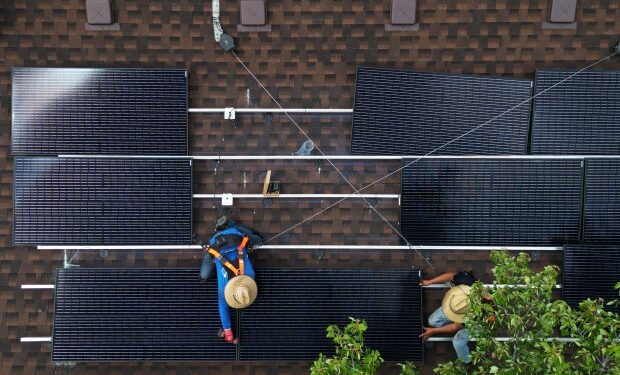Starting next year, some new Illinois rooftop solar owners will see lower savings on their electric bills than those who got their solar panels earlier.
The long-expected change — required under the state’s 2021 climate law — essentially trims a generous introductory offer, but ComEd and the nonprofit consumer watchdog Citizens Utility Board say that residential rooftop solar will remain a very good deal for customers.
“You can still save an awful lot of money on your electricity bill by deploying solar,” said Scott Vogt, ComEd vice president of strategy and energy policy.
Residential rooftop solar owners in Illinois currently get the electricity they produce and use immediately for free — in the sense that there’s no charge from investor-owned utilities ComEd and Ameren — and that won’t be changing Jan. 1.
What will change — for new rooftop solar owners only — is that they will get smaller bill credits for the excess solar they produce and export to the the grid.
People who already get the current, more generous bill credits, will continue to do so.
Under what is known as net metering, ComEd residential solar owners currently get a credit of 13.6 cents per kilowatt-hour for electricity they export to the grid, or the full price they would pay for a kilowatt-hour of electricity. That essentially means they get a free kilowatt-hour of electricity for every kilowatt-hour they export.
That changes Jan 1, when new residential solar owners in ComEd territory will get a credit equivalent to 6.5 cents for each kilowatt-hour of electricity they export to the grid. That’s because while customers will still get a credit equal to the full value of supplying the electricity to the grid, they will no longer get a credit for delivering that electricity to consumers (something they don’t actually do), nor will they get a credit for taxes and fees.
To put that in perspective, a customer who is exporting 200 kilowatt-hours of electricity to the grid this month would get a $27 monthly credit under the current net metering rate, and a $13 credit under the new one.
But for those getting the new net-metering rate there’s an additional upfront rebate, which comes to about $2,100 for the average customer.
The current net-metering arrangement works out a bit better for customers than the new one will, Citizens Utility Board spokesman Jim Chilsen said in a written statement, but after the change solar will remain a great deal in Illinois.
“Incentives will still make deep cuts in the installation costs, and you’ll be drastically reducing your electric bills in the future,” Chilsen said.

ComEd’s online solar calculator offers an example. The Tribune looked at a home in Oak Park with good solar potential and a $32,000 solar roof. Under the current net-metering arrangement, the estimated upfront cost for the roof after incentives and rebates would be about $11,000 — actually more than the upfront cost under the new net-metering arrangement ($9,000).
In turn, the monthly electric bill savings would be higher under the current net-metering system ($126 a month) than under the new one ($103 a month).
Both roofs would pay for themselves in about 10 years, but the net savings to the homeowner (due to lower electricity costs) over 25 years would be somewhat higher under the current net-metering rate (about $27,000) than than under the upcoming one (about $23,000).
Some customers have taken notice of the net-metering change, with Bin Bin Lee of Bridgeport saying that he had planned to wait to install a solar roof on the brick bungalow he shares with his wife and two young children.
Then his solar installer started talking about the upcoming decrease in bill credits.
“I decided, ‘I guess I should just do it now,’” said the 36-year-old IT consultant.
At Chicago-based Windfree Solar, which does thousands of rooftop solar installations a year, founder and president Doug Snower said that about 30% of customers have been concerned about the net-metering change.
Still, he said, it’s unclear how much of a role that concern is playing in the decision to actually move ahead and get a solar roof.
He said Windfree hadn’t yet determined how much it can do for new customers who are only approaching the company now in a quest to get a fully operating roof solarby Dec. 31. But Snower said the company’s basic message for those people is the change “is not going to impact them as much as they think.”
“The benefits of going solar are so much more substantial and the return on your investment is so good, that that small piece of net-metering change shouldn’t dissuade you from moving forward,” Snower said.
In order to get the current net-metering rate, ComEd customers must have their rooftop solar installed and operating before Jan. 1, and they must have filed the proper paperwork for a ComEd permission to operate notice before Jan. 1, according to Vogt.
At Sunrun, the nation’s largest home solar panel and battery storage company, Senior Vice President of Public Policy Amy Heart said that Illinois has given solar providers a lot of time to plan for the change in net metering.
The decrease has been in the works since the 2021 Climate and Equitable Jobs Act.
Heart also praised Illinois for setting up an upfront rebate for customers, unlike California, which experienced significant pushback when it made its own changes to net metering.
“Illinois has done this right,” Heart said.
She said that customers who lease rooftop solar can add a battery, at a cost of about $15 to $20 a month, and then go to the hourly ComEd rate for electricity. That arrangement, she said, will lead to an overall savings that is very similar to the savings under the current net-metering rate.
“It’s a shift in how solar and batteries are compensated,” Heart said, noting that the initial stage of net metering was intended to get the solar market started in Illinois.
“We’re graduating,” she said.







